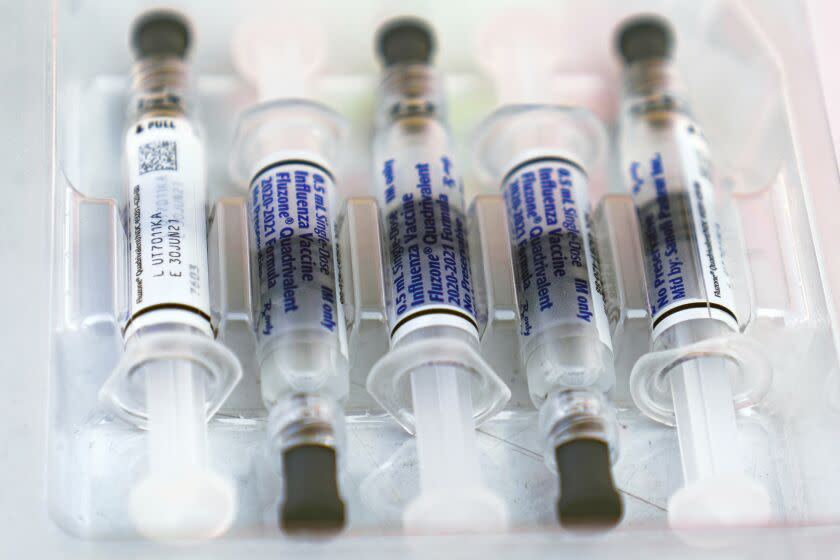Southern California braces for difficult flu season as cases rise after COVID lull

Flu is being detected at increased levels for this time of year in Southern California, a trend that officials say could foreshadow a difficult season following a pandemic-induced lull.
At this point, overall influenza activity in California remains low, according to the state Department of Public Health. But given that the flu typically begins ramping up nationally in late November or December, above-normal levels now could lead to further challenges later.
The current levels of flu activity are "much higher" compared to pre-pandemic years, the Los Angeles County Department of Public Health said in a bulletin to healthcare providers. "In previous years, an early start to the season was associated with a season with substantially higher influenza activity."
County Public Health Director Barbara Ferrer put it bluntly: "Flu is definitely circulating here in L.A. County."
"I think, as a matter of fact, we have a higher percentage of specimens testing positive for flu at this point in the year than we usually have in a normal influenza season," she said Thursday.
The county is not unique in this regard. As of last week, "early increases in seasonal influenza activity have been reported in most of the United States, with the Southeast and south-central areas of the country reporting the highest levels of activity," according to the U.S. Centers for Disease Control and Prevention.
Nationally, 4.4% of influenza tests reported to the CDC were positive over the week ending Oct. 15, agency data show. That's up from 2.8% the prior week.
Officials generally recommend the flu vaccine for people 6 months and older. This year, officials are also suggesting those age 65 or older get turbocharged flu vaccines that are considered higher dose or "adjuvanted," which helps trigger a stronger immune response.
But some doctors say seniors shouldn't excessively delay getting vaccinated if they can't find a higher-dose shot. A standard flu shot can be a better decision than waiting — especially if you're at higher risk for infection or severe health outcomes.
Recent L.A. County data show that 8.5% of lab specimens tested at county sentinel labs were positive for the flu. That's much higher than in recent years, when the positivity rate was less than 4%.
"In 2017-18 and 2019-20, an early start to the [flu] season was a harbinger of seasons with substantially higher indicators of influenza activity and severity," the county said in a bulletin.
Influenza, the bulletin continued, "is associated with serious illnesses, hospitalizations, and deaths, particularly among older adults, very young children, pregnant persons, and persons of all ages with certain chronic medical conditions."
San Diego County is also warning of a "rapid and early start" to the flu season. Health officials have reported several large suspected respiratory outbreaks this month, including clusters of illnesses at schools.
“Get tested for COVID-19 and the flu when you develop respiratory symptoms and stay away from others if you are sick,” San Diego County public health officer Dr. Wilma Wooten said in a statement.
Health officials say getting vaccinated, especially now, remains the best way for residents to protect themselves from both influenza and COVID-19. Residents can get both shots at the same time.
"One reason why we tell people to get them both at the same time is everybody should be getting those vaccinations now," Ferrer said. "Flu is here."
For people who would rather get the flu and COVID-19 booster shots on separate days, Ferrer suggested not waiting long between them.
"You don't need to wait in between. So I don't think it really matters if you get your flu shot today and you get your [updated COVID-19] bivalent booster tomorrow," she said. "But I would urge people to do them both, either very close together or at the same time."
To book a flu or COVID-19 vaccination appointment, or find a walk-in clinic near you, visit MyTurn.ca.gov.
This story originally appeared in Los Angeles Times.

